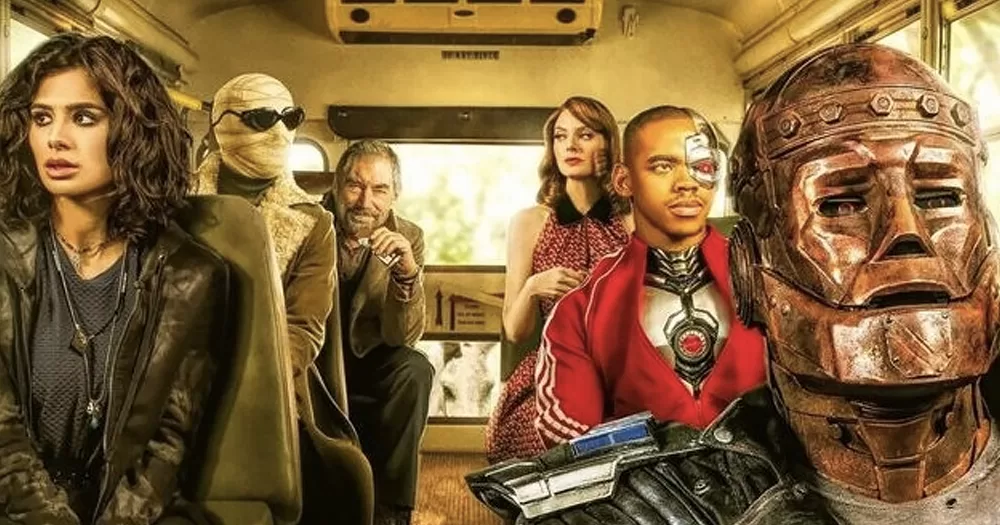GCN contributor David Ferguson discussed the inherent queerness of the comic series Doom Patrol and its TV adaptation.
I have been meaning to write about the Doom Patrol TV series for some time now as, in my opinion, it is the queerest comic book adaptation out there. The Doom Patrol are a group of people who have powers that have alienated them from society and caused them trauma, a feeling that queer people can empathise with. In addition to that, the show features queer actors and characters.
The vibe of the TV show very much fits in with the spooky season and, as the last few episodes of the final season are set to air soon, it is the perfect watch for Halloween.
Dubbed the “world’s strangest heroes”, the original team of the Chief, Robotman, Elasti-Girl and Negative Man debuted in 1963. It was created by writers Arnold Drake and Bob Haney and artist Bruno Premiani. The basic idea behind the comics, as Drake explained, was a “group of superheroes who hate being superheroes. That was the new aspect. That was the thing that made Doom Patrol different, these people hated being superheroes.”
The TV adaptation features the same main characters with the addition of Cyborg and a bunch of others that are heavily featured in the celebrated run by non-binary writer Grant Morrison (Volume 2, issues 19-63). According to Arnold Drake, Morrison was the only person who saw what he was trying to do with this team of superheroes. The whole TV series is heavily influenced by Morrison’s ideas and the characters included in their run, such as Dorothy Spinner, Crazy Jane and a sentient neighbourhood called Danny the Street.
she was ruthless and left the whole room speechless ???
mother is mothering#DoomPatrol pic.twitter.com/4SOpzFV6GK
— Michael Carter-Kord (RIP Doom Patrol) (@FatherLessSnrlx) October 21, 2023
In the TV show, Negative Man/Larry Trainor is a man trying to deal with being gay. He is voiced by queer actor Matt Bomer, who also plays him in the flashbacks that go into his romantic and family life before he absorbed the “negative spirit”. The show also features Alan Tudyk as the villain, Mr Nobody. However, for a show that includes moaning sex ghosts, a hero whose flex-activated telekinesis can send a shock wave of orgasms, the strangest character of all is Danny The Street.
In the comic, Danny was originally a cross-dressing trans person (referred to in the comics as a “transvestite”) who offered himself as a safe haven for people who either weren’t accepted by or didn’t feel at home in society. As the show’s creators recognised the problematic and dated nature of the term “transvestite”, Danny was turned into a non-binary character.
“Nothing is weird, everything’s fine” is the new motto. pic.twitter.com/sZbkjY1Npm
— Doom Patrol (@DCDoomPatrol) October 23, 2023
Debuting in one of the queerest episodes of TV ever – ‘Danny Patrol’, season one, episode 8 – Danny is protecting the people on his street, the so-called “Danizens”, from the evil government organisation, the Bureau of Normalcy. One of the characters helping Danny is Negative Man, who is really impacted by Danny and drag queen Maura Lee Karupt (Alan Mingo Jr.)‘s lessons of celebrating peoples’ differences.
As Matt Bomer said, “As much as it’s a fun superhero show, Doom Patrol is really about the human condition, and the capacity for even the most marginalised amongst us to find our inner hero.”
The series includes, amongst other things, Robotman dealing with his terrible past, Elast-girl with her self-esteem and Negative Man being racked with guilt over his sexuality. Bomer shared that Negative Man is “one of the most three-dimensional, fully realised gay characters [he’s] ever gotten to play.”
© 2023 GCN (Gay Community News). All rights reserved.
Support GCN
GCN is a free, vital resource for Ireland’s LGBTQ+ community since 1988.
GCN is a trading name of National LGBT Federation CLG, a registered charity - Charity Number: 20034580.
GCN relies on the generous support of the community and allies to sustain the crucial work that we do. Producing GCN is costly, and, in an industry which has been hugely impacted by rising costs, we need your support to help sustain and grow this vital resource.
Supporting GCN for as little as €1.99 per month will help us continue our work as Ireland’s free, independent LGBTQ+ media.
